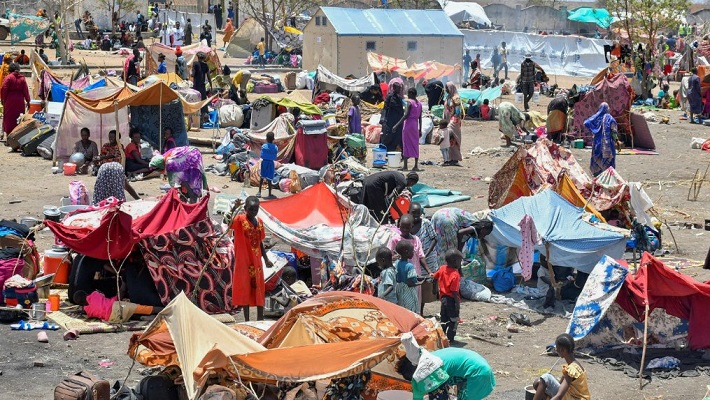By Paschal Norbert
VATICAN CITY, FEBRUARY 20, 2024 (CISA) – In his Sunday Angelus address with the faithful and pilgrims gathered at St. Peter’s Square, the Holy Father prayed for peace in the conflict-ridden Sudan and appealed to warring parties to seek dialogue and end the decade-long conflicts in the country.
“Ten years have passed now since the outbreak of the armed conflict in Sudan, which has caused a very grave humanitarian situation. I once again ask the conflicting sides to stop this war, which inflicts a great deal of harm to the people and the future of the country. Let us pray that paths of peace can be found soon, to build the future of dear Sudan,” he stated.
The pope was referencing the conflict in Sudan that began with the Darfur crisis in 2003 before the current conflict, which started on April 15, 2023, when violent clashes erupted between the Sudanese Armed Forces (SAF) and the paramilitary Rapid Support Forces (RSF), resulting in the displacement of nearly 8 million people, including internally displaced people (IDPs), asylum seekers and refugees.
According to the UNCHR, this conflict exacerbated many of Sudan’s existing challenges, including ongoing conflicts, disease outbreaks, economic and political instability and climate emergencies brought about by the harsh climatic conditions in the country.
To date, nearly 8 million people have been displaced. This includes more than 6 million people displaced within Sudan and more than 1.5 million people who fled to neighbouring countries.
Pope Francis also decried the state of lawlessness in the Cabo Delgado province of Mozambique citing increased cases of insecurity and violence against civilians.
The pope noted, “The violence against defenceless populations, the destruction of infrastructure, and insecurity are again rampant in the province of Cabo Delgado, Mozambique, where the Catholic mission of Our Lady of Africa in Mazezeze was also set on fire in recent days.”
He urged, “Let us pray for peace to return to that tormented region. And let us not forget so many other conflicts that stain the African continent and many parts of the world with blood: also Europe, Palestine, Ukraine…”
Recent reports from Cabo Delgado, Mozambique’s northernmost province, with enormous economic potential including natural gas reserves that could make it a leading natural gas exporter and a coastline attractive to tourism, indicate that the conflict that began in 2017 is far from over. Cases of beheadings, kidnappings, and ambushes are still being reported; and after seizing a strategic village last month, fighters believed to be jihadists killed more than 20 soldiers in an attack on February 9.
According to ACAPS, an independent analysis provider, the Cabo Delgado conflict has its roots in the pre-existing socioeconomic marginalization of northern Mozambique, political and religious ideology, and inequalities worsened by the discovery of minerals and natural gas deposits in the region, which has threatened the livelihood of the local population.
The insecurity in the province is also due to the Al-Shabaab deliberately targeting humanitarians and humanitarian facilities. This coupled with limited financial resources, and bureaucratic obstacles limits humanitarian organizations’ ability to reach people in need.
